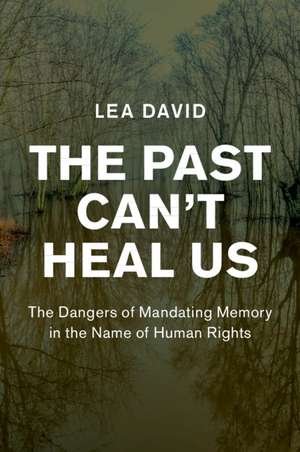The Past Can't Heal Us: The Dangers of Mandating Memory in the Name of Human Rights: Human Rights in History
Autor Lea Daviden Limba Engleză Paperback – 15 iun 2022
| Toate formatele și edițiile | Preț | Express |
|---|---|---|
| Paperback (1) | 234.11 lei 6-8 săpt. | |
| Cambridge University Press – 15 iun 2022 | 234.11 lei 6-8 săpt. | |
| Hardback (1) | 564.43 lei 3-5 săpt. | +22.96 lei 4-10 zile |
| Cambridge University Press – 15 iul 2020 | 564.43 lei 3-5 săpt. | +22.96 lei 4-10 zile |
Din seria Human Rights in History
-
 Preț: 281.30 lei
Preț: 281.30 lei - 8%
 Preț: 564.43 lei
Preț: 564.43 lei -
 Preț: 184.88 lei
Preț: 184.88 lei -
 Preț: 232.45 lei
Preț: 232.45 lei -
 Preț: 230.10 lei
Preț: 230.10 lei -
 Preț: 230.61 lei
Preț: 230.61 lei -
 Preț: 310.51 lei
Preț: 310.51 lei -
 Preț: 286.30 lei
Preț: 286.30 lei -
 Preț: 318.22 lei
Preț: 318.22 lei -
 Preț: 312.46 lei
Preț: 312.46 lei -
 Preț: 255.09 lei
Preț: 255.09 lei -
 Preț: 276.61 lei
Preț: 276.61 lei -
 Preț: 242.96 lei
Preț: 242.96 lei -
 Preț: 232.73 lei
Preț: 232.73 lei -
 Preț: 232.24 lei
Preț: 232.24 lei -
 Preț: 277.57 lei
Preț: 277.57 lei - 9%
 Preț: 593.67 lei
Preț: 593.67 lei -
 Preț: 194.09 lei
Preț: 194.09 lei -
 Preț: 230.51 lei
Preț: 230.51 lei -
 Preț: 227.33 lei
Preț: 227.33 lei - 14%
 Preț: 895.53 lei
Preț: 895.53 lei - 11%
 Preț: 597.10 lei
Preț: 597.10 lei -
 Preț: 216.39 lei
Preț: 216.39 lei -
 Preț: 280.74 lei
Preț: 280.74 lei -
 Preț: 320.75 lei
Preț: 320.75 lei -
 Preț: 288.42 lei
Preț: 288.42 lei - 14%
 Preț: 757.85 lei
Preț: 757.85 lei - 11%
 Preț: 600.84 lei
Preț: 600.84 lei -
 Preț: 264.74 lei
Preț: 264.74 lei -
 Preț: 233.22 lei
Preț: 233.22 lei -
 Preț: 327.51 lei
Preț: 327.51 lei -
 Preț: 272.75 lei
Preț: 272.75 lei - 11%
 Preț: 537.58 lei
Preț: 537.58 lei -
 Preț: 288.25 lei
Preț: 288.25 lei - 14%
 Preț: 708.38 lei
Preț: 708.38 lei -
 Preț: 225.97 lei
Preț: 225.97 lei
Preț: 234.11 lei
Nou
Puncte Express: 351
Preț estimativ în valută:
44.81€ • 48.69$ • 37.67£
44.81€ • 48.69$ • 37.67£
Carte tipărită la comandă
Livrare economică 21 aprilie-05 mai
Preluare comenzi: 021 569.72.76
Specificații
ISBN-13: 9781108817103
ISBN-10: 1108817106
Pagini: 255
Dimensiuni: 152 x 228 x 14 mm
Greutate: 0.35 kg
Editura: Cambridge University Press
Colecția Cambridge University Press
Seria Human Rights in History
Locul publicării:Cambridge, United Kingdom
ISBN-10: 1108817106
Pagini: 255
Dimensiuni: 152 x 228 x 14 mm
Greutate: 0.35 kg
Editura: Cambridge University Press
Colecția Cambridge University Press
Seria Human Rights in History
Locul publicării:Cambridge, United Kingdom
Cuprins
1. Introduction; 2. Human rights as an ideology? Obstacles and benefits; 3. What Is moral remembrance?; 4. The institutionalization of moral remembrance: the case study of Palestine and Israel; 5. The institutionalization of moral remembrance: the case study of Western Balkans; 6. Human rights, memory and micro-solidarity; 7. Mandating memory, mandating conflicts.
Recenzii
'Learning from history is an obvious step for post-conflict societies. Yet, enforcing remembrance through a standard trope of techniques and scripted commemorations also presents its own challenges. Lea David walks us through the process of how apparent reconciliation actually might exacerbate conflict and tensions. This is a wonderful book that should be read not just by governments and scholars, but by all those who seek to remember and remedy past wrongs.' Miguel Centeno, Princeton University
'The Past Can't Heal Us presents a path breaking analysis of the limits of the global standardization of memorialization. The novel comparative analysis discloses ever-expanding fissures in foundational paradigms in Human Rights discourse and practice while grounding fascinating re-conceptualizations of ideology and micro-solidarity. David's provocatively critical and courageous voice permeates every illuminating chapter. A must read for scholars, students and laypersons alike.' Carol Kidron, University of Haifa
'Human rights are often seen as a panacea capable of curbing political extremism and social inequalities. In this wonderful and highly original book, Lea David shows convincingly that enforcing human rights policies in a world dominated by the nation-state model of social organisation is likely to produce the opposite effect: prescribed moral remembrance regularly generates more group animosity. This is an excellent, thoughtful and brave contribution that combines superb analytical skills with the comprehensive and meticulous empirical research.' Siniša Malešević, University College Dublin
'The Past Can't Heal Us presents a path breaking analysis of the limits of the global standardization of memorialization. The novel comparative analysis discloses ever-expanding fissures in foundational paradigms in Human Rights discourse and practice while grounding fascinating re-conceptualizations of ideology and micro-solidarity. David's provocatively critical and courageous voice permeates every illuminating chapter. A must read for scholars, students and laypersons alike.' Carol Kidron, University of Haifa
'Human rights are often seen as a panacea capable of curbing political extremism and social inequalities. In this wonderful and highly original book, Lea David shows convincingly that enforcing human rights policies in a world dominated by the nation-state model of social organisation is likely to produce the opposite effect: prescribed moral remembrance regularly generates more group animosity. This is an excellent, thoughtful and brave contribution that combines superb analytical skills with the comprehensive and meticulous empirical research.' Siniša Malešević, University College Dublin
Notă biografică
Descriere
Lea David exposes the dangers and pitfalls of mandating memory in the name of human rights in conflict and post-conflict settings.
